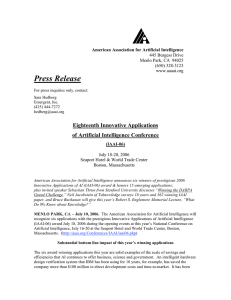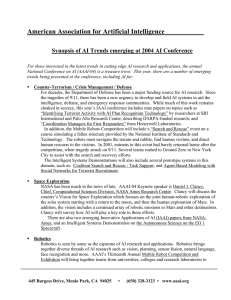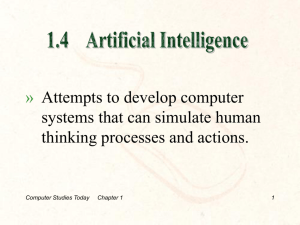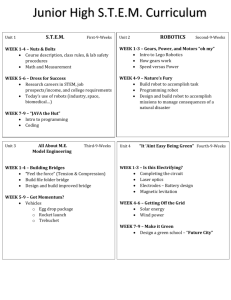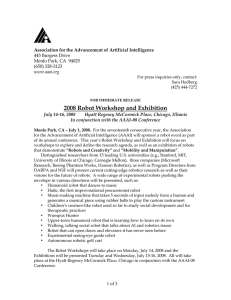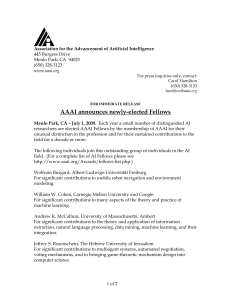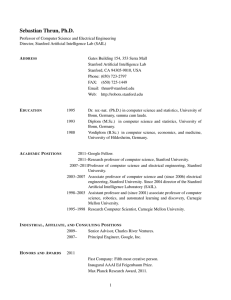Press Release DARPA Grand Challenge Winner Sebastian Thrun:
advertisement
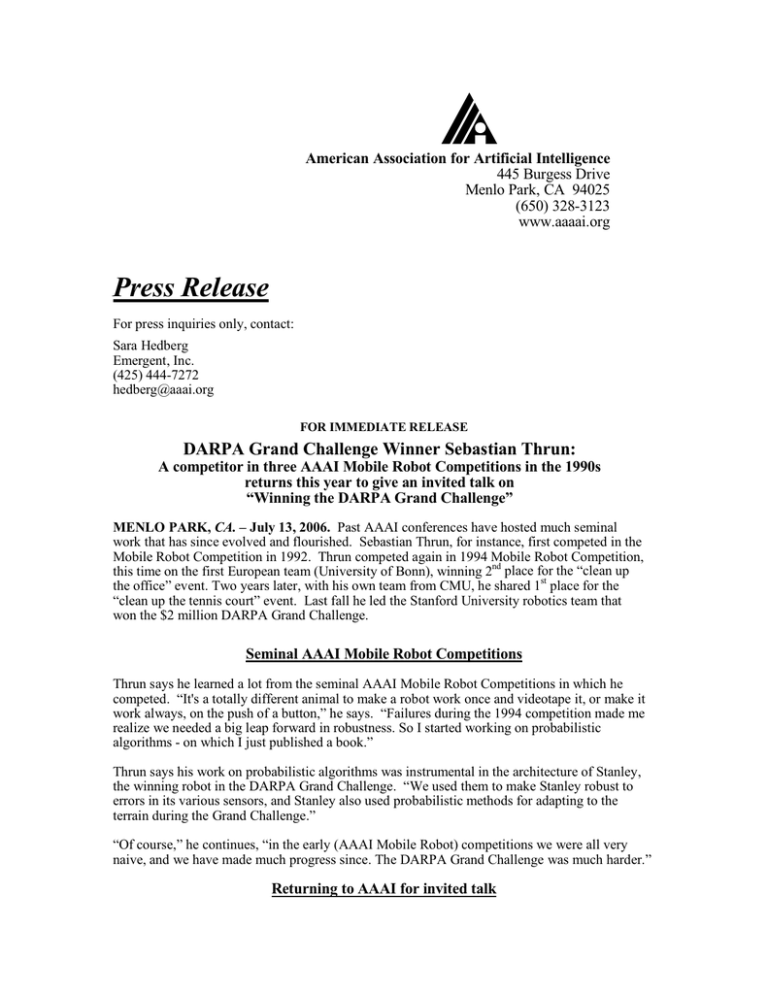
American Association for Artificial Intelligence 445 Burgess Drive Menlo Park, CA 94025 (650) 328-3123 www.aaaai.org Press Release For press inquiries only, contact: Sara Hedberg Emergent, Inc. (425) 444-7272 hedberg@aaai.org FOR IMMEDIATE RELEASE DARPA Grand Challenge Winner Sebastian Thrun: A competitor in three AAAI Mobile Robot Competitions in the 1990s returns this year to give an invited talk on “Winning the DARPA Grand Challenge” MENLO PARK, CA. – July 13, 2006. Past AAAI conferences have hosted much seminal work that has since evolved and flourished. Sebastian Thrun, for instance, first competed in the Mobile Robot Competition in 1992. Thrun competed again in 1994 Mobile Robot Competition, this time on the first European team (University of Bonn), winning 2nd place for the “clean up the office” event. Two years later, with his own team from CMU, he shared 1st place for the “clean up the tennis court” event. Last fall he led the Stanford University robotics team that won the $2 million DARPA Grand Challenge. Seminal AAAI Mobile Robot Competitions Thrun says he learned a lot from the seminal AAAI Mobile Robot Competitions in which he competed. “It's a totally different animal to make a robot work once and videotape it, or make it work always, on the push of a button,” he says. “Failures during the 1994 competition made me realize we needed a big leap forward in robustness. So I started working on probabilistic algorithms - on which I just published a book.” Thrun says his work on probabilistic algorithms was instrumental in the architecture of Stanley, the winning robot in the DARPA Grand Challenge. “We used them to make Stanley robust to errors in its various sensors, and Stanley also used probabilistic methods for adapting to the terrain during the Grand Challenge.” “Of course,” he continues, “in the early (AAAI Mobile Robot) competitions we were all very naive, and we have made much progress since. The DARPA Grand Challenge was much harder.” Returning to AAAI for invited talk He will present an invited talk on “Winning the DARPA Grand Challenge” at this year’s IAAI conference. As Thrun says, “This talk will provide insights into the software architecture of Stanford’s winning robot ‘Stanley.’ The robot heavily relied on advanced sensor technology, and advanced artificial intelligence to make sense out of the massive amounts of sensor data acquired by the vehicle. The talk will introduce you into the fascinating world of autonomous robotics, share with you many of the race insights, and discuss with you some of the implications for the future of our society.” “This success (of Thrun’s team winning the Grand Challenge) is important to AI applications for two reasons,” according to IAAI Conference Chair Bruce Porter. “First, the success is the direct result of creative application of AI technologies -- just the sort of innovation that the IAAI conference seeks to showcase. Second, the success opens the door for many new applications and products, both in military and civilian domains.” “Sebastian Thrun's achievement in leading the Stanford Stanley team to victory in the DARPA Grand Challenge is a major breakthrough for intelligent robotics,” concurs AAAI President Alan Mackworth. “Like the Web, robotics is another transformative technology. But the promise of robotics has not been fulfilled as rapidly as we had hoped. However, Sebastian's work, both theoretical and practical, shows the way forward to building significant robotic technologies such as assistive robotics for the elderly and disabled. This opens an area of huge potential for AI and robotics researchers.” Thrun says he hopes attendees of his talk will take away “excitement, a new vision for robotics and AI -- or just a fun story to tell their friends and students.” Porter hopes they come away with “Thrun’s passion for innovation, his can-do attitude and his deep understanding of AI technologies.” Thrun active AAAI volunteer “AAAI (the organization) has always been very close to my heart,” Thrun notes. He is currently a Councilor at AAAI, and was just elected an AAAI Fellows. “I just gave an invited talk two years ago,” he notes. This was shortly after the first DARPA Grand Challenge in which no autonomous vehicle successfully navigated the course and completed the race. At that 2004 conference a reporter from USA Today asked Thrun whether any robot would or could ever win the DARPA race. Thrun confidently assured him that it would happen … very soon. # # # About AAAI Founded in 1979, the American Association for Artificial Intelligence (www.aaai.org) is a nonprofit scientific membership society devoted to advancing the science and practice of AI. Its mission is to: (1) advance the scientific understanding of the mechanisms underlying intelligent thought and behavior, (2) facilitate their embodiment in machines, (3) serve as an information resource for research planners and the general public concerning trends in AI, and (4) offer training for the current and coming generations of AI researchers and practitioners. The Association has sponsored an annual conference, regarded as the premier gathering in the field, since 1980.
